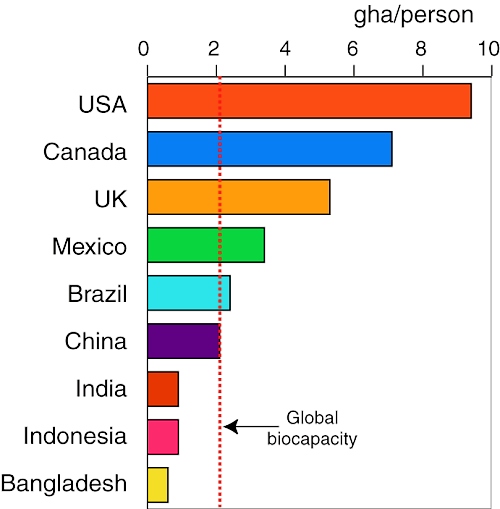Scientists have created a model to show humans' effects on the environment. It is called the ecological footprint. Like all models it only reflects certain aspects of reality, so it is not completely accurate, but it does show a fairly representative picture.
A person's ecological footprint is the area of Earth (soil and water) that is required to maintain that individual's lifestyle. The calculation of a person's or a group of people's ecological footprint indicates how much of the Earth they are using.
 |
| Ecological footprint by country |
 |
 |
| This graph shows that the global biocapacity is around 2 global hectares per person, which is significantly less than 5gha that is the average in Hungary!!!! |
Ecological footprints take a number of factors into account. When considering a country, it looks at the population, the overall standard of living, the technologies that are used, as well as ecological productivity. You can calculate your personal ecological footprint here. In 2003 the average use for each person on the planet was 2.3 hectares, but at the present population, we each only have about 1.9 hectares and that is decreasing as the population grows!
The goal of ecological footprints is to help people understand how dangerously close we are to using up all the available resources. This lifestyle endangers the ecosystems abilities to adapt, and in time, mankind itself. In order to maintain life on the planet, we must decrease the pressure we are putting on it. There is an extreme difference between the ecological footprints of developed countries vs. those of the developing countries, but it is clear that the developing countries are rapidly following the example of the developed countries, adding increasing pressure.
 |
Solutions to the environmental problems that we face depend on societal attitudes and a willingness to change. We will be able to create a new image of the future that isn't a consumer-based society? Will there be sufficient motivation to make sacrifices?
"Think globally, act locally" has become key phrase in the environmental movement to try to motivate people to change their behaviours. Some easy ways to change are to limit what we buy to what we need and to shop selectively, buying products that are designed to last and produce less waste. Additionally, shoppers can select products that are less harmful to the environment, either in their production, packaging and/or functioning.
| Eco-friendly labels |
There are many simple and practical ways in which our energy and water use can be decreased, as well as many grants available to fund items like solar panels, double (or triple) glazed windows, more energy-efficient appliances, etc.
Societal changes will require that community relationships become more important than money and material possessions. Right now, many people feel that the solutions are the responsibility of the governments, but in fact, environmental protection is everyone's responsibility and the sooner each individual takes concrete steps to change his or her own lifestyle, the sooner global changes will be realized.
No comments:
Post a Comment